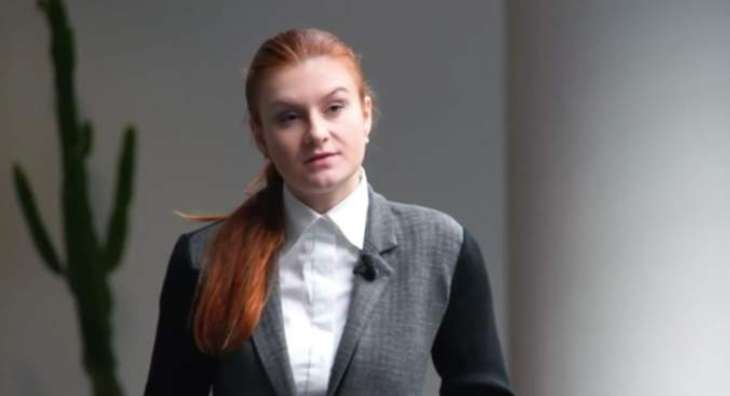A US federal judge during a status conference set Russian National Maria Butina's next hearing for March 28 amid requests from prosecutors for more time to finish the investigation
WASHINGTON (Pakistan Point News / Sputnik - 27th February, 2019) A US Federal judge during a status conference set Russian National Maria Butina's next hearing for March 28 amid requests from prosecutors for more time to finish the investigation.
In December, Butina pleaded guilty to acting as a foreign agent without prior notification to the US Attorney General and agreed to cooperate with authorities. The Russian Foreign Ministry said US authorities browbeat Butina into confessing by creating unbearable detention conditions and threatening her with a long prison sentence.
Butina's defense attorney Robert Driscoll told Sputnik ahead of the status conference that he hoped the judge would set a sentencing date.
However, during Tuesday's hearing, US prosecutor Erik Kenerson said that cooperation with Butina was "ongoing," and asked that the judge therefore delay setting a date for sentencing.
"Your cooperation is still needed," Judge Tanya Chutkan told Butina during a hearing at the District Court for the District of Columbia on Tuesday.
During the hearing the defense pointed out that Butina has been detained for a substantial part of the term she is facing.
The judge took that into consideration, but said that she also understands the concerns of the prosecution and that further cooperation from Butina is needed by the government.
Butina, who initially pleaded not guilty to the charges, faces up to five years in prison, according to the plea agreement reached with prosecutors in December.
The plea document signed by the Russian national said that Butina conspired with a "Russian government official," who had served as the Deputy Governor to the Russian Central Bank since at least 2015, and at least one other person.
Russian President Vladimir Putin, referring to the charges of being an unregistered foreign agent, said there was no reason for the United States to indict Butina in the first place given she was not charged with any mission by the Russian government.
Earlier in February, Butina told US journalist James Bamford that she was not a Russian spy evidenced by the fact she did not conceal her activities which included promoting gun rights. In his article, Bamford said US authorities and the media used Butina as the "perfect scapegoat" to blame for Russian election meddling - charges which Moscow has repeatedly denied.
HOPES FOR SENTENCING, DEPORTATION
The judge during Tuesday's conference asked prosecutors to alert defense whether they will be ready to convert the March 28 status hearing into a sentencing hearing.
Driscoll told reporters on Tuesday that he expects sentencing to take place a week after the March 28 hearing.
Butina's lawyer added that he understood where the prosecution was coming from with delaying the sentencing, but noted that the defense was ready for setting a date, soon to be followed by deportation.
"She'll be deported right after sentencing... that's in the plea agreement and that's what we presume will happen," Driscoll said on Tuesday.
The attorney also said he presumes Butina will get a short sentence considering time already served.
Driscoll said, with respect to her condition, that Butina is doing well in US custody, all things considered.
She can call her family in Russia from prison several times per week and she is no longer being held in solitary confinement, he said.
Butina is aided by the fact that she takes a spiritual approach to life, her lawyer said. He added that a priest from the Russian Orthodox Cathedral in Washington, DC visits her every other week.
Butina was arrested in mid-July of last year and imprisoned in Washington, DC before being transferred to a detention center in Alexandria, Virginia.
In November, Butina's father appealed to Putin in a letter asking him to intervene in the situation given the "torture" his daughter had experienced while in custody, including sleep deprivation, humiliating strip searches, lengthy solitary confinement and denied medical care. Later the same day, the Russian Embassy in the United States said Butina had spent 67 days in an individual cell, exceeding the limit recommended by the so-called Nelson Mandela Rules for the treatment of prisoners.




